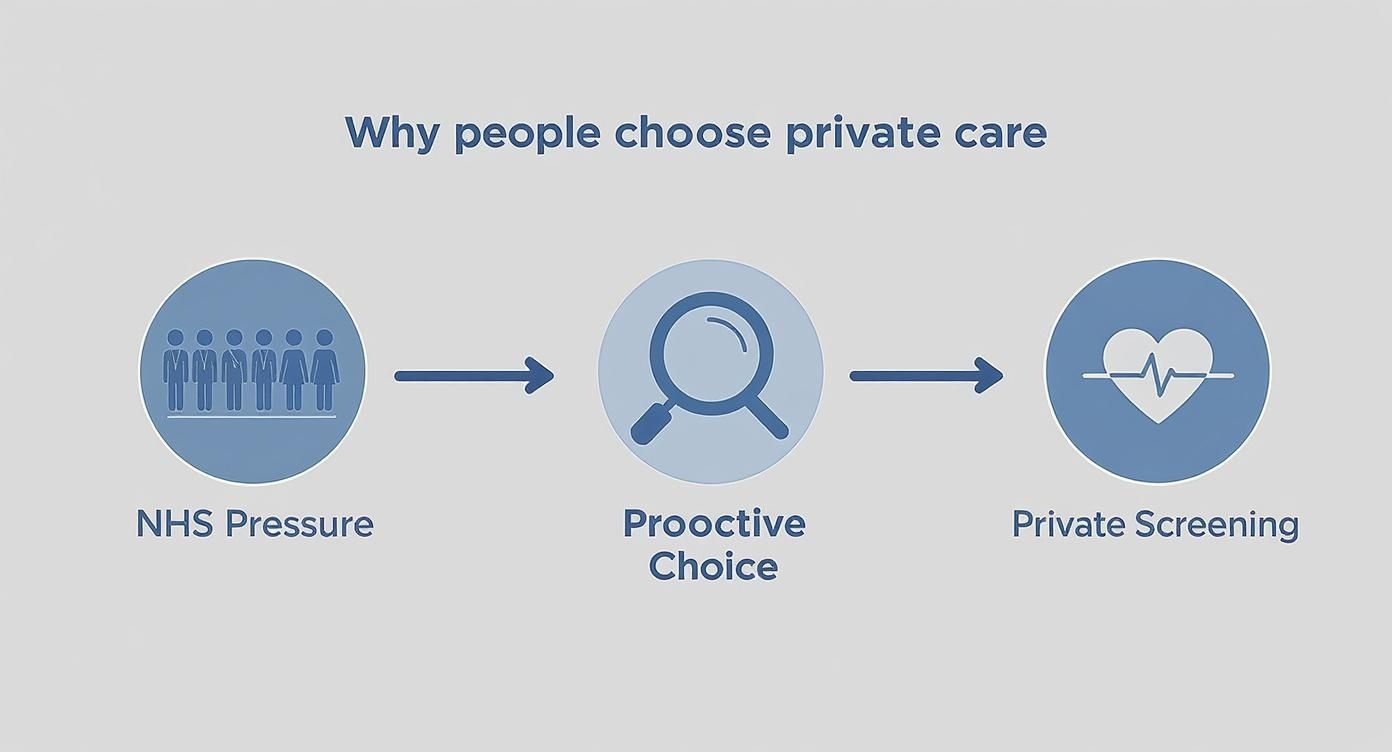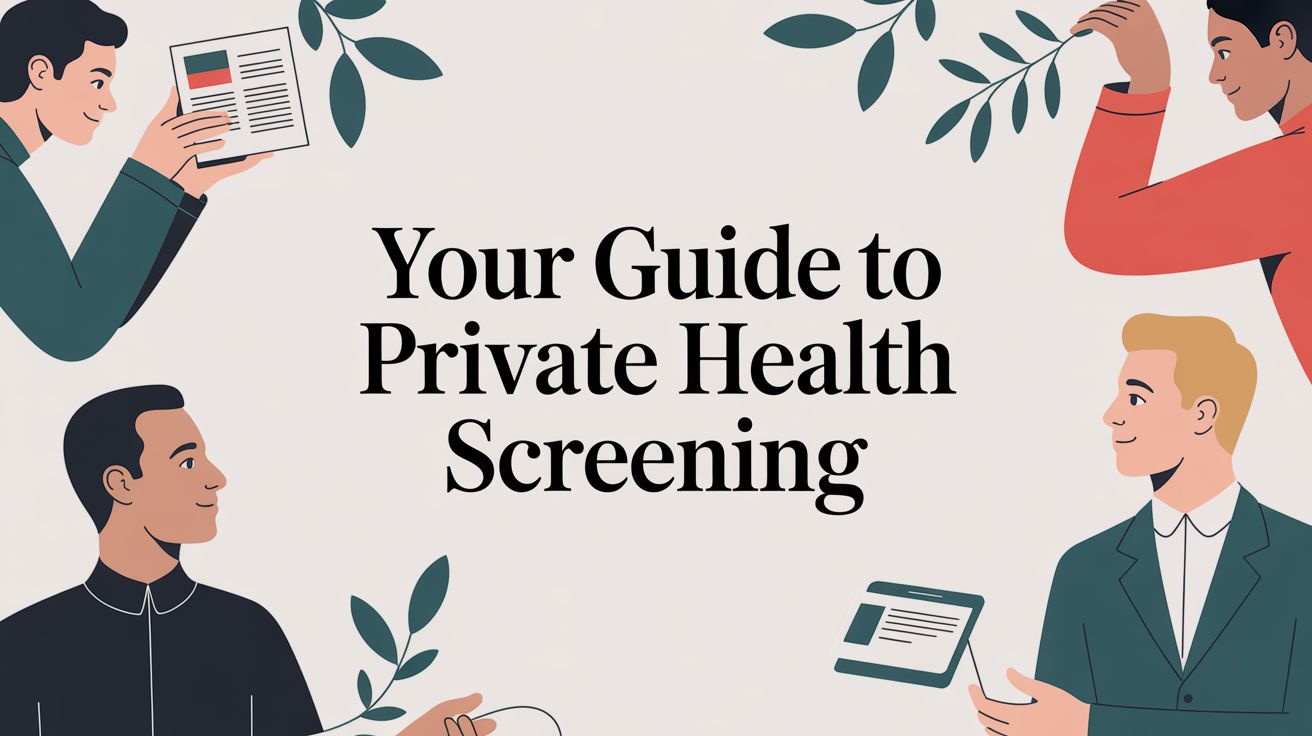.webp)
Think of a private health screening as a comprehensive MOT for your body. It's a proactive check-up designed to give you a detailed snapshot of your current wellbeing, identifying potential health risks before any symptoms show up. This empowers you to make smarter decisions and take real control of your long-term health.

For a long time, most of us have treated healthcare reactively. We wait until we feel unwell, spot a strange new symptom, or get injured before we even think about seeing a doctor. It’s a bit like only taking your car to the mechanic after it’s already broken down on the motorway—the problem is already causing a major disruption, and the fix is likely to be far more complicated.
A private health screening completely flips that model on its head. It’s all about prevention, focusing on maintenance rather than just repair. By regularly checking key health markers, you can spot subtle changes or underlying risks early on. This allows for timely interventions that can stop more serious conditions from ever developing.
This proactive mindset is gaining serious traction. The demand for private health screenings has shot up across the UK, with searches for 'private health check' growing by nearly 60% in recent years. It’s a clear sign of a cultural shift towards taking ownership of our own health. You can read more on these trends in the latest health check-up market analysis.
A screening is essentially a data-gathering mission for your body. It involves a series of tests and examinations to build a comprehensive baseline of your health. This is powerful because it:
A private health screening isn't just about finding problems; it’s about confirming what you're doing right and empowering you with the knowledge to stay healthy for longer. It provides a personalised roadmap for your future wellbeing.
This approach is a key part of the wider private healthcare system, which champions patient choice and quick access to medical services. If you’re new to the concept, getting to grips with the basics is a great first step. You can learn more about how it all works in our guide on what private healthcare is and how it works. Ultimately, investing in a screening is an investment in your future self, giving you the insights needed to live a healthier, more informed life.
The shift towards private health screenings isn't just a trend; for many, it's a practical response to the growing pressures on our public healthcare system. When you need clear answers about your health, long waits for routine checks can be a source of real anxiety.
Think of the NHS as a major motorway during rush hour. It’s a vital service, but the sheer volume of traffic can lead to frustrating standstills. For non-urgent diagnostics or preventive checks, you might find yourself stuck in a long queue, waiting weeks, or even months, for an appointment.
This is where private healthcare offers a different route. It’s like a clear side road that lets you bypass the congestion and get to your destination—answers about your health—much faster. It's not about replacing the motorway, but about having another path when time is of the essence.
At its core, this shift is all about access. People are choosing private health screenings to take back control of their healthcare timeline. Instead of waiting anxiously, they can book an appointment within days and get their results just as quickly. That speed offers priceless peace of mind and allows for much earlier intervention if something is wrong.
The data backs this up. The UK is facing a serious screening crisis, with some projections showing that by 2025, over 60% of eligible adults may miss or have delayed at least one critical health screening. Combine that with NHS waiting lists for an estimated 7.54 million treatments, and it’s clear why one in seven Britons (15%) turned to private healthcare last year. You can get more insights on the current UK screening challenges.
While faster access is a huge draw, the move towards private options is also about getting a more personalised and thorough experience. The key motivations really come down to a few things:
The rise of digital health has also made private care far more accessible. Understanding the advantages of online diagnoses shows just how much convenience is empowering people to take charge of their health on their own terms.
Choosing a private health screening is fundamentally about empowerment. It’s the decision to proactively invest in your own health intelligence, giving you the clarity and reassurance needed to manage your wellbeing effectively without delay.
Ultimately, this growing preference isn't a knock on the NHS, but a reflection of how our priorities are changing. In a world where we’re more health-conscious than ever, the ability to get timely, detailed, and personal insights into our wellbeing has become a truly valuable choice.
Walking into a clinic for a private health screening can feel a bit mysterious if you’ve never done it before. But honestly, the whole process is designed to be clear, comfortable, and above all, genuinely useful for you. Let's pull back the curtain and walk through what happens, step by step.
Think of it less like a test and more like a guided tour of your own body. The aim isn't to find problems, but to gather high-quality information that gives you a sharp, accurate picture of where your health is right now. It’s about taking the guesswork out of wellbeing and putting you firmly in control.
This infographic shows a common path people take towards private care. It often starts with frustrations with the wider system and ends with a proactive decision to get answers.

The journey from facing NHS pressures to choosing a private screening highlights a desire for timely, clear information and a greater say in one's own health journey.
Your appointment will almost always kick off with a friendly, relaxed chat. A doctor or specialist nurse will sit down with you to talk through your health in a bit of detail. This isn't an interrogation; it's a conversation.
They’ll ask about your lifestyle – what you eat, how active you are, whether you smoke or drink. They'll also touch on your medical history and any health issues that might run in your family. This context is vital because it helps them build a complete picture and make sure the screening focuses on what’s most relevant to you.
After the chat, you’ll move on to the physical examination. This part involves measuring a few key health indicators that create a baseline for your overall wellbeing. These fundamental checks usually include:
A huge part of any decent health screening is the blood test. It's incredible what a small blood sample can reveal about what's going on inside your body, often flagging things long before you'd ever feel a symptom. It’s like sending a scout ahead to map out your internal health landscape.
While the specific tests can vary depending on the package you choose, most will analyse a core set of biomarkers to give a broad overview.
To get the most out of your screening, it helps to understand what’s actually being measured. Here’s a simple breakdown of the most common tests included in various packages and what they're looking for.
Common Tests Included in Health Screening Packages
Test CategoryExamples of TestsWhat It Checks ForFull Blood CountRed & White Blood Cells, PlateletsA general health indicator that can flag issues like anaemia, infection, or inflammation. It's a foundational test.Cholesterol ProfileHDL ("Good"), LDL ("Bad"), TriglyceridesYour risk profile for heart disease and stroke. It measures the different types of fat circulating in your blood.Liver FunctionALT, AST, GGT (Enzymes)The health of your liver. Elevated enzymes can be an early sign of liver damage or disease.Kidney FunctionCreatinine, Urea, eGFRHow well your kidneys are filtering waste from your blood. Essential for spotting signs of kidney stress.Diabetes RiskGlucose, HbA1cYour blood sugar levels, both at that moment and over the past few months. Key for identifying pre-diabetes or diabetes.Thyroid FunctionTSH, Free T4How well your thyroid gland is working, which controls your metabolism, energy levels, and mood.Vitamins & MineralsVitamin D, Vitamin B12, Iron/FerritinLevels of key nutrients vital for energy, bone health, and immune function. Deficiencies are surprisingly common.Specific MarkersPSA (men), CA-125 (women)Cancer-specific markers. For example, the PSA test is for prostate health, while CA-125 is linked to ovarian health.
These tests move beyond just feeling "fine" and give you concrete data. It’s this objective information that allows you to see trends, understand your risks, and make informed decisions about your health. For a deeper dive, our guide on a general health check-up explains why these metrics are so important.
Depending on the screening tier you choose, you might get into even more detail. More advanced packages often look at specific vitamin deficiencies (like Vitamin D or B12) or include cancer markers like the Prostate-Specific Antigen (PSA) test for men. These deeper insights provide a highly personalised assessment of your health risks, giving you a truly comprehensive overview.
Getting your detailed report back is where the real value of a private health screening kicks in. At first glance, a document packed with numbers, acronyms, and medical jargon can feel a bit overwhelming. But it’s best to see this report not as a final judgment, but as the first page of your own personalised health roadmap.
This report is a snapshot of your health at one specific moment. It gives you hard data that can either confirm you’re on the right track or shine a light on areas that might need a bit more attention. The numbers are just one part of the story; their true meaning comes from understanding them in the context of your lifestyle and medical history.
The real magic happens during your follow-up consultation. This is your chance to sit with a doctor and turn all that data into meaningful, practical insights.
Your results will usually be laid out clearly, showing each biomarker that was tested. Next to your result, you’ll likely see a "reference range," which shows the typical values for a healthy person.
It’s natural to zero in on any numbers that fall outside this range, but it's crucial not to jump to conclusions. A single result outside the normal range isn’t automatically a cause for alarm. All sorts of things can influence test results, including:
This is exactly why the post-screening consultation is the most important part of the whole process. The doctor’s job is to interpret these numbers with a full understanding of you as a person. For a deeper dive into the kind of data you might see, our article on private blood tests breaks down what specific markers can reveal.
During your follow-up, the doctor will walk you through what each result means for you. This is a two-way conversation, not a lecture. It’s your time to ask questions and get a real handle on the story your body is telling.
Think of your screening results as the 'what' and the follow-up consultation as the 'so what'. The data identifies your current health status, while the doctor helps you figure out what to do with that information to look after your future wellbeing.
Based on this chat, you'll work together to build a clear, personal action plan. This plan won’t always mean making dramatic changes. Often, the best path forward is a series of small, manageable steps designed around your specific results and lifestyle.
Your action plan could include:
This final step transforms your private health screening from a one-off event into an ongoing journey. It arms you with the knowledge and guidance to take real, meaningful steps toward a healthier future.

With the private healthcare market getting busier, picking the right provider for your health screening has never been more important. The sheer number of choices can feel a bit overwhelming, but a clear, step-by-step approach will help you find a clinic that truly fits your needs and gives you real confidence in your decision.
The UK's private healthcare sector is seeing huge growth. Admissions to private hospitals and clinics hit a new high of 939,000 in 2024, which is a 3% jump from the year before. This shows a strong and growing public trust in independent healthcare, making it crucial to partner with a reputable clinic for your health journey. You can discover more insights on recent private healthcare admissions to see the full picture.
More options are great, but it does mean you need to do your homework. Choosing a provider isn’t just about finding the lowest price; it’s about investing in quality, expertise, and genuine support.
First things first: regulation. In England, every independent healthcare provider must be registered with the Care Quality Commission (CQC). The CQC is the independent watchdog for health and social care, and its ratings are the most reliable indicator of a clinic's safety, effectiveness, and overall quality of care.
Always check for a provider’s CQC rating on their website. Seeing a ‘Good’ or ‘Outstanding’ rating gives you a strong assurance that the clinic is held to rigorous national standards. This is a non-negotiable step—it ensures you're choosing a service that's accountable for its practices. You can learn more about meeting healthcare quality standards and accreditation in our detailed guide.
A clinic is only as good as its clinical team. Take a moment to look into the qualifications and experience of the doctors and nurses who will be performing your screening and explaining your results. A good clinic will always be transparent about its staff's credentials.
Next, have a close look at the screening packages themselves. A quality private health screening should never be a one-size-fits-all affair. The best providers offer a smart range of packages tailored to different ages, genders, and health risks. Be wary of clinics that push a long list of obscure tests that might not be clinically relevant for you. Instead, look for packages built around foundational tests for things like heart health, diabetes risk, and organ function.
The goal isn't to have the most tests, but the right tests. A great provider will help you understand why each test is recommended, ensuring your screening is both relevant and cost-effective.
What happens after you get your results is just as important as the tests. This is where you can really see the difference between an average provider and a great one. Before you commit, ask a few questions about their follow-up support:
Choosing the right provider is about finding a trusted partner for your proactive health journey. By focusing on accreditation, clinical expertise, and follow-up care, you can make a choice that delivers true value and, most importantly, peace of mind.
Thinking about a private health screening often brings up a few practical questions. Getting your head around the cost, how to book, and how often you might need one is key to making a confident, well-informed decision.
Let's clear up some of the most common queries people have. This will help turn your curiosity into a clear action plan for your health.
The cost can vary quite a bit, depending on the clinic and just how deep you want the screening to go. A basic package, covering essential blood tests and physical metrics, might start from £150-£300. These are a great way to get a solid foundational overview of your health.
For more advanced screenings that bring in diagnostics like ECGs, detailed hormone panels, or specific cancer markers, the price can range from £500 to over £2,000. The vital thing is to compare what’s included in each package—not just the final price tag—to make sure it lines up with what you want to achieve for your health.
No, and that’s one of the biggest benefits of going private. You don't need a referral from your NHS GP. You can book directly with the clinic you choose, giving you complete control over when you get it done and what kind of screening you have.
That said, it’s always a good idea to share the results with your own GP. This keeps your main medical record complete and up-to-date, which helps create better continuity of care across the board. For a bit more detail on what to expect as a new patient, our information on a Well Person Check provides a really helpful overview.
A private health screening is a self-referral process, empowering you to take proactive steps towards understanding and managing your health on your own schedule.
There isn’t a single rule that fits everyone here. The ideal frequency really depends on your age, personal and family medical history, and your lifestyle.
Your screening provider can give you a personalised recommendation based on your initial results. And for anyone looking for targeted insights into particular issues, new options are always emerging, like direct-to-consumer personalized kits for gastrointestinal health.
This all comes down to your specific insurance policy. Most standard policies are designed to cover the diagnosis and treatment of acute conditions, so they often exclude purely preventive health checks.
Some premium or corporate wellness plans, however, might include a health screening as a benefit. The best thing to do is to always check the terms of your policy with your insurer before you book an appointment.
Ready to take the next step in managing your health? At The Vesey, we offer a range of health screenings designed to provide you with clear, actionable insights. Book your appointment online or call our friendly team today to find the right screening for you.

Some premium or corporate wellness plans, however, might include a health screening as a benefit. The best thing to do is to always check the terms of your policy with your insurer before you book an appointment.Ready to take the next step in managing your health? At The Vesey, we offer a range of health screenings designed to provide you with clear, actionable insights. Book your appointment online or call our friendly team today to find the right screening for you.
